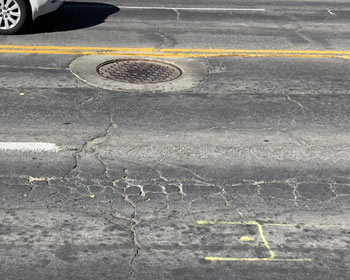

Research Reports |
| Title: | Evaluation of the Durability of Thin Lift Surface Treatments |
| Authors: | Pedro Romero, Shuangli Bao, and Daniel Sudbury |
| University: | University of Utah |
| Publication Date: | Nov 2019 |
| Report #: | MPC-19-404 |
| Project #: | MPC-468 |
| TRID #: | 01727661 |
| Keywords: | durability, evaluation and assessment, overlays (pavements), pavement cracking, pavement distress, pavement performance, roughness, service life, stone matrix asphalt, surface course (pavements), surface treating |
| Type: | Research Report – MPC Publications |
 Fourteen Thin Lift Treatments (TLTs) in Utah's Department of Transportation (UDOT) Region 2 were evaluated over a five-year period in order to assess their performance. Surface distress data was quantified using Pavement Condition Indices (PCIs), and Remaining Service Life (RSL) were estimated following procedures utilized by UDOT.
Fourteen Thin Lift Treatments (TLTs) in Utah's Department of Transportation (UDOT) Region 2 were evaluated over a five-year period in order to assess their performance. Surface distress data was quantified using Pavement Condition Indices (PCIs), and Remaining Service Life (RSL) were estimated following procedures utilized by UDOT.
With the first 5 year's evaluation, 2 TLT sections have failed by Wheel Pass (WP) index, and 2 TLT sections have failed by ENV index. I-80.1 and SR-210 failed due to the WP evaluation, and SR-89 and SR-210 failed due to the ENV evaluation with SR-210 failing mainly due to environmental distresses. In total 3 sections have reached failure.
When all of the different treatments are grouped and both environmental and traffic loading were considered, it was found that the average life for the dense graded surface treatments was 7.3 years, while the average life for the open graded surface course was slightly better at 7.9 years. It is estimated that the average life of Stone Matrix Asphalt (SMA)is 11.7 years.
The local TLTs were compared to similar pavements from the Long Term Pavement Performance database. Both UDOT and LTPP roads are seeing a greater number of environmental failures as opposed to structural or wheel path failures.
It was concluded that environmental factors were the main cause of the deterioration of the surface treatments. The TLT's placed on UDOT's Region 2 have a life expectancy of at least 7 years. Based on their performance, it is recommended that, whenever feasible, SMA should be used on high valued roads.
Romero, Pedro, Shuangli Bao, and Daniel Sudbury. Evaluation of the Durability of Thin Lift Surface Treatments, MPC-19-404. North Dakota State University - Upper Great Plains Transportation Institute, Fargo: Mountain-Plains Consortium, 2019.